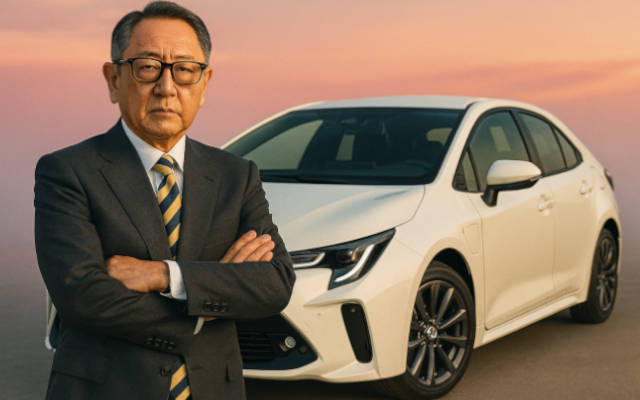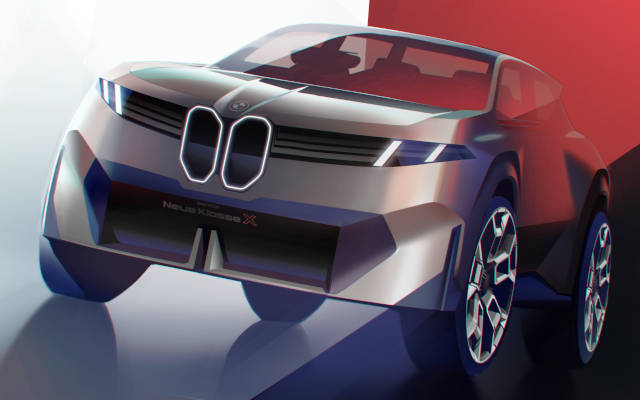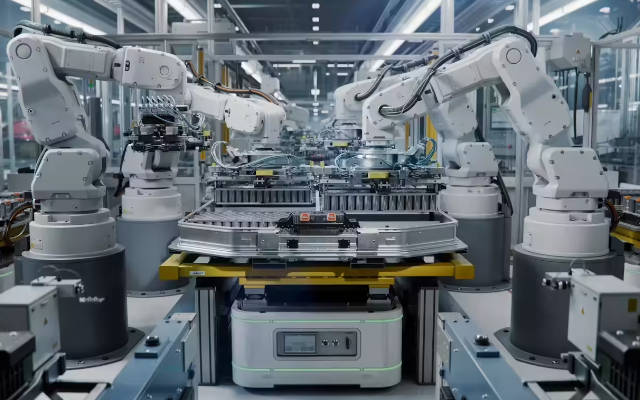 EDITOR'S PICK
EDITOR'S PICK
SAIC's MG4 Leads World in Deployment of Semi-Solid-State Battery
17 Oct 2025 | Synopsis
 China's SAIC MG has launched the MG4, the first mass-produced EV with a semi-solid-state battery using manganese-based lithium-ion chemistry. This breakthrough offers higher energy density, improved safety, and environmental benefits over traditional LFP batteries. Approved for sale in China, the MG4 signals a major leap in EV tech - underscoring China's lead in battery innovation and cost-effective electric mobility
China's SAIC MG has launched the MG4, the first mass-produced EV with a semi-solid-state battery using manganese-based lithium-ion chemistry. This breakthrough offers higher energy density, improved safety, and environmental benefits over traditional LFP batteries. Approved for sale in China, the MG4 signals a major leap in EV tech - underscoring China's lead in battery innovation and cost-effective electric mobilityLiquid Air Could Be the Clean Energy Storage Breakthrough the Planet Needs
16 Oct 2025 | Synopsis
 Liquid air energy storage (LAES) cools and compresses air into a liquid, storing renewable energy for later use. It's scalable, low-impact, and ideal for balancing intermittent sources like wind and solar. When demand rises, the liquid air is warmed, expands, and drives turbines to generate electricity. LAES could be a breakthrough for clean energy storage with 50-70% efficiency, offering long-duration capacity without geographic limits or toxic materials.
Liquid air energy storage (LAES) cools and compresses air into a liquid, storing renewable energy for later use. It's scalable, low-impact, and ideal for balancing intermittent sources like wind and solar. When demand rises, the liquid air is warmed, expands, and drives turbines to generate electricity. LAES could be a breakthrough for clean energy storage with 50-70% efficiency, offering long-duration capacity without geographic limits or toxic materials.Toyota's Chairman Said That EVs Pollute More Than Hybrids Do, So Here's What Research Says
16 Oct 2025 | Synopsis
 Toyota Chairman Akio Toyoda claims EVs pollute more than hybrids due to battery production and Japan's fossil-fuel-heavy grid. Researchers counter that EVs offset their higher initial emissions after 20,000-28,000 miles and outperform hybrids long-term - even on coal-heavy grids. Studies show EVs emit less CO2 per mile and will improve further with battery recycling.
Toyota Chairman Akio Toyoda claims EVs pollute more than hybrids due to battery production and Japan's fossil-fuel-heavy grid. Researchers counter that EVs offset their higher initial emissions after 20,000-28,000 miles and outperform hybrids long-term - even on coal-heavy grids. Studies show EVs emit less CO2 per mile and will improve further with battery recycling.What If BMW Stopped Making Electric Cars? The Harsh Reality Behind That Idea
16 Oct 2025 | Synopsis
 If BMW quit making EVs, it would face regulatory bans, lose tech leadership, alienate younger buyers, and shrink its market share. EVs drive growth, innovation, and brand relevance. Abandoning them would hurt perception, supply chains, and investor confidence. BMW's legacy is built on progress - ditching electrification would erase that identity
If BMW quit making EVs, it would face regulatory bans, lose tech leadership, alienate younger buyers, and shrink its market share. EVs drive growth, innovation, and brand relevance. Abandoning them would hurt perception, supply chains, and investor confidence. BMW's legacy is built on progress - ditching electrification would erase that identityPlummeting Battery Prices Will Push BEVs Below Parity Soon
16 Oct 2025 | Synopsis
 Battery costs are falling so fast that battery electric vehicles (BEVs) could reach price parity with internal combustion vehicles within 2-4 years in Europe, and in China some models have already done so. The author expects battery pack costs to drop ~70% over the next five years, which would allow automakers to slash BEV retail prices while maintaining margins. That shift may force more aggressive pricing competition and encourage faster EV adoption.
Battery costs are falling so fast that battery electric vehicles (BEVs) could reach price parity with internal combustion vehicles within 2-4 years in Europe, and in China some models have already done so. The author expects battery pack costs to drop ~70% over the next five years, which would allow automakers to slash BEV retail prices while maintaining margins. That shift may force more aggressive pricing competition and encourage faster EV adoption.
 EVWorld Exclusive
EVWorld Exclusive
EV Depreciation: A Temporary Dip, Not a Long-Term Trend
20 Oct 2025 |  EV depreciation concerns are real but overstated. Fleet failures and battery uncertainty skew resale data, yet modern EVs show strong longevity and lower operating costs. Automakers now offer battery health reports, extended warranties, and OTA updates to boost confidence. Policy support and LFP chemistry further stabilize value. As transparency improves, EVs will redefine long-term worth - not just match it.
EV depreciation concerns are real but overstated. Fleet failures and battery uncertainty skew resale data, yet modern EVs show strong longevity and lower operating costs. Automakers now offer battery health reports, extended warranties, and OTA updates to boost confidence. Policy support and LFP chemistry further stabilize value. As transparency improves, EVs will redefine long-term worth - not just match it.
Horse Powertrain: The Hybrid Trojan Horse
17 Oct 2025 |  Horse Powertrain, a joint venture by Renault, Geely, and Aramco, offers compact hybrid engines like the C1 to retrofit EV platforms. Designed as range extenders, these engines run on multiple fuels and meet Euro 7 standards. Though marketed as green tech, their real-world impact is debated - especially as studies show PHEVs are rarely charged. Horse may be a transitional solution, but 500-mile EVs are poised to dominate long-term.
Horse Powertrain, a joint venture by Renault, Geely, and Aramco, offers compact hybrid engines like the C1 to retrofit EV platforms. Designed as range extenders, these engines run on multiple fuels and meet Euro 7 standards. Though marketed as green tech, their real-world impact is debated - especially as studies show PHEVs are rarely charged. Horse may be a transitional solution, but 500-mile EVs are poised to dominate long-term.
Sticker Shock and Stagnant Pay: Why New Cars Are Slipping Out of Reach
17 Oct 2025 |  New car prices have outpaced wage growth, making ownership increasingly unaffordable. Even Ford's $30K EV pickup and other sub-$30K models may remain out of reach for many without incentives or financing reform. With monthly payments rising and federal credits phasing out, the affordability gap is reshaping the auto market. Shared mobility and micro-EVs may offer alternatives, but structural change is needed to restore access.
New car prices have outpaced wage growth, making ownership increasingly unaffordable. Even Ford's $30K EV pickup and other sub-$30K models may remain out of reach for many without incentives or financing reform. With monthly payments rising and federal credits phasing out, the affordability gap is reshaping the auto market. Shared mobility and micro-EVs may offer alternatives, but structural change is needed to restore access.
Toyota FT-Me: Shared Mobility Concept with Big Implications
17 Oct 2025 |  Toyota's FT-Me is a two-seat electric microcar designed for shared urban mobility, not just teens. Developed with UK government support, it features hand-only controls, solar panels, and a lightweight frame. Aimed at car clubs and last-mile use, it could offer affordable, accessible transport with low emissions. With steady utilization and supportive policy, FT-Me may become a viable, sustainable option in the UK's evolving mobility landscape.
Toyota's FT-Me is a two-seat electric microcar designed for shared urban mobility, not just teens. Developed with UK government support, it features hand-only controls, solar panels, and a lightweight frame. Aimed at car clubs and last-mile use, it could offer affordable, accessible transport with low emissions. With steady utilization and supportive policy, FT-Me may become a viable, sustainable option in the UK's evolving mobility landscape.
Creative Destruction vs. Fossil Retrenchment: Why Project 2025 Risks Leaving America Behind
16 Oct 2025 |  Project 2025 protects fossil fuel incumbents by dismantling Biden-era clean energy policies. Nobel economist Philippe Aghion argues that climate progress depends on creative destruction - letting green innovators outcompete legacy polluters. The U.S. risks falling behind as global markets embrace clean tech. Even its passport has slipped from the top 10. Innovation, not retrenchment, is the path forward
Project 2025 protects fossil fuel incumbents by dismantling Biden-era clean energy policies. Nobel economist Philippe Aghion argues that climate progress depends on creative destruction - letting green innovators outcompete legacy polluters. The U.S. risks falling behind as global markets embrace clean tech. Even its passport has slipped from the top 10. Innovation, not retrenchment, is the path forward
SEARCH RSSTREAM
 42 New Postings In Past 24 Hours
42 New Postings In Past 24 Hours
Category:mobility
Region:NoAmerica
Date:20 Oct 2025
Category:finance
Region:NoAmerica
Date:20 Oct 2025
Category:finance
Region:IndoAsia
Date:20 Oct 2025
Category:mobility
Region:AsiaPacific
Date:20 Oct 2025
Category:mobility
Region:MidEast
Date:20 Oct 2025
Category:mobility
Region:AsiaPacific
Date:20 Oct 2025
Category:mobility
Region:AsiaPacific
Date:20 Oct 2025
Category:mobility
Region:Europe
Date:20 Oct 2025
Category:mobility
Region:Europe
Date:20 Oct 2025
Category:mobility
Region:Africa
Date:20 Oct 2025
Category:mobility
Region:SoAmerica
Date:20 Oct 2025
Category:mobility
Region:Europe
Date:20 Oct 2025
Category:mobility
Region:NoAmerica
Date:20 Oct 2025
Category:mobility
Region:NoAmerica
Date:20 Oct 2025
Category:finance
Region:NoAmerica
Date:20 Oct 2025
Category:mobility
Region:NoAmerica
Date:20 Oct 2025
Category:mobility
Region:Global
Date:20 Oct 2025
Category:mobility
Region:AsiaPacific
Date:20 Oct 2025
Category:mobility
Region:Europe
Date:20 Oct 2025
Category:review
Region:NoAmerica
Date:20 Oct 2025
